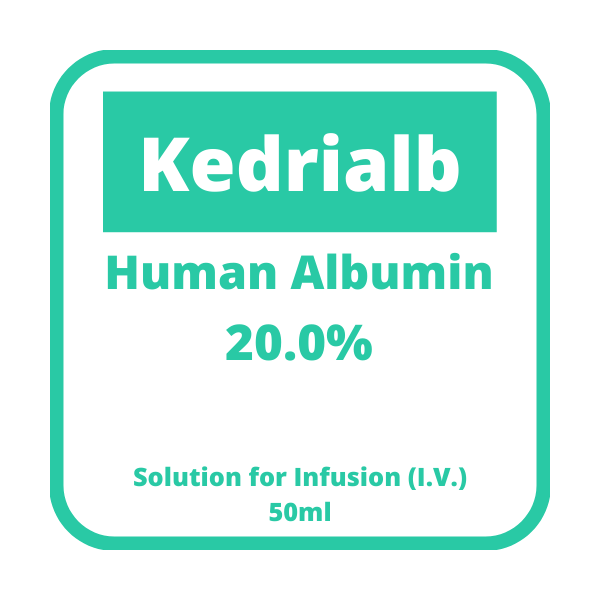KEDRIALB Human Albumin 200g / L (20.0% w/v) Solution for IV Infusion 50mL
We recognize that purchasing medications can be a deeply personal matter. To respect your privacy, we ensure that all orders are packaged discreetly, with no indication of the contents on the packaging. This means that even our couriers remain unaware of the package contents.
Furthermore, we uphold strict confidentiality standards. We guarantee that your order information will never be disclosed to any third party. Your trust is paramount to us, and we are committed to safeguarding your privacy at every step of the process. Our dedication to discretion and confidentiality is part of our unwavering commitment to you, our valued customer.
Features
- Human Albumin
Description
Indications/Uses
Dosage/Direction for Use
When human albumin is used in replacement therapy, the dosage required is guided by the usual circulatory parameters.
The lowest limit for colloidal osmotic pressure is 20 mmHg (2.7 kPa).
If albumin is to be administered, the dose in grams required can be estimated using the following calculation: (See equation.)

The physiological plasma volume may be calculated as approximately 40 mL/kg of body weight.
As the formula is, in any case, only approximate, laboratory monitoring of achieved protein concentration is recommended.
In case of extensive substitution therapy and in cases with hematocrit below 30%, see "Precautions".
Pediatric use: The fact that in children, the physiological plasma volume is age-dependent should be taken into account.
METHOD OF ADMINISTRATION: KEDRIALB is ready for use and is to be administered by intravenous infusion only.
The infusion rate should be adjusted according to individual circumstances and indications; normally be set at 1-2 mL/min.
Maximum time for administration is 3 hours.
Infusion rate should not exceed 30 ml/min during plasmapheresis.
If large volumes are to be administered, the product should be warmed to room or body temperature before use.
When suggested by clinical indications, Human Albumin (Kedrialb) can be diluted with 0.9% NaCl solution and 5% or 10% glucose solutions.
Overdosage
Contraindications
Allergic reactions to this preparation.
All conditions in which hypervolaemia and its consequences (e.g. increased stroke volume, elevated blood pressure) or haemodilution could represent a risk for the patient.
Examples of such conditions are: Decompensated cardiac insufficiency; Hypertension; Oesophageal varices; Pulmonary oedema; Haemorrhagic diathesis; Severe anaemia; Renal and post-renal anuria; Dehydration (unless sufficient fluid is infused simultaneously).
Warnings
To reduce the risk of transmission of infective agents, donors and donations are duly screened. Each unit of plasma used for the preparation of Human Albumin (Kedrialb) was tested and found negative for the presence of HBsAg, of HIV1, HIV2 and HCV antibodies, and was tested for the ALT content; the plasma pool has also been controlled for the presence of HCV-RNA through a genic amplification technique and the result was non reactive. The production process includes procedures for the removal and inactivation of viruses.
The ultrafiltration and diafiltration treatment removes metal ions; the risk of aluminium accumulation and of the toxicity related thereto are therefore drastically reduced.
Special Precautions
The colloid-osmotic effect of human albumin 20% is approximately four times that of blood plasma.
Therefore, when concentrated albumin is administered, care must be taken to assure adequate hydration of the patient. Patients should be monitored carefully to guard against circulatory overload and hyperhydration.
If the required volume of Human Albumin (Kedrialb) 20% exceeds 200 mL, appropriate additional electrolyte solutions should be administered to maintain normal fluid balance.
Alternatively, therapy may be continued with 5% human albumin solution.
If comparatively large volumes are to be replaced, controls of coagulation and haematocrit are necessary. Care should be taken to ensure adequate substitution of other blood constituents (coagulation factors, electrolytes, platelets, and erythrocytes).
If haematocrit drops below 30%, packed red cells should be given in order to maintain the oxygen transport capacity of the blood.
Effects on the ability to drive and use machines: There are no indications that human albumin may impair the ability to drive or use machines.
Use In Pregnancy & Lactation
Experimental animal studies are insufficient to assess the safety with respect to reproduction, development of the embryo or foetus, course of gestation and peri- and postnatal development. However, human albumin is a normal constituent of human blood, therefore albumin may be used, if clearly needed, during pregnancy and lactation. However, in general, particular attention must be paid when a substitution of volume is effected in a pregnant patient.
Adverse Reactions
Any side effects that have not been described must be communicated to the physician or pharmacist.
Caution For Usage
Storage
Do not freeze.
The solution is clear or slightly opalescent.
Do not use solutions which are cloudy or have deposits.
Once the infusion container has been opened the content should be used immediately.
Any unused solution should be discarded appropriately.

